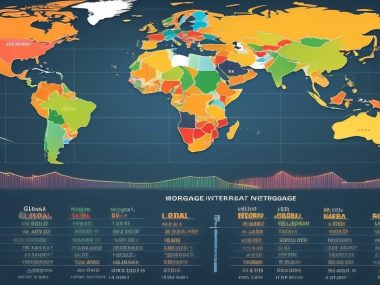Did you know that 75% of homeowners around the globe are affected by their country’s mortgage rates? As someone always on the lookout for the best financial deals, I find it fascinating how mortgage rates in other countries can significantly differ from what I’m used to. This variance not only impacts global investors but also individuals looking to buy homes abroad. In this post, I’ll dive into the complexities of understanding mortgage rates across different nations in March, highlighting key factors that influence these rates, including financial markets and average term, and how they compare to ours. Let’s explore this intriguing aspect of global finance together.
Key Takeaways
- Understand the global mortgage landscape by exploring mortgage rates in different countries to make informed decisions.
- Consider the influencing factors such as economic conditions, government policies, and market trends when analyzing mortgage rates by region.
- Gain country-specific insights to tailor your mortgage strategy based on unique regulations and market conditions.
- Develop investment strategies that align with favorable mortgage rates and market conditions in specific countries.
- Use purchasing tips derived from case studies to navigate the mortgage process efficiently and effectively.
- Stay informed about future predictions in mortgage rates to anticipate market shifts and plan your mortgage decisions accordingly.
Global Mortgage Overview
Interest Rates Trends
Across the globe, average interest rates on home mortgages are always changing, influenced by factors such as market dynamics and long-term economic forecasts as of March. They go up and down based on many things. Right now, we’re seeing a trend where rates are increasing in many countries. This makes it more expensive for people to borrow money to buy homes.
In some places like the United States, average mortgage rates have gone up significantly in the past year since March. But in Japan, rates remain low. This shows that not all countries experience changes the same way.
I’ve noticed that when I compare mortgage rates from different countries, there’s no one-size-fits-all answer. Each country has its unique pattern of fluctuation. It’s fascinating to see how these patterns, including mortgage interest rates and the average mortgage rate, unfold over time.
Economic Factors
Economic indicators play a big role in shaping average mortgage rates. For example, if a country’s economy is doing well, interest rates might go up. This is because banks think people can afford to pay more.
Inflation also affects mortgage rates. When average prices of things go up (inflation), interest rates usually do too. This is because lenders want to make sure they still make money even when money loses its value.
From my personal experience, keeping an eye on average economic growth and inflation has helped me understand why my own mortgage rate changes. It’s important to stay informed about these factors.
Government Policies
Government policies can have a big impact on mortgage rates. Changes in laws or regulations can make borrowing either cheaper or more expensive for people, affecting mortgage interest rates, including the average mortgage rate, the latest mortgage rate, and even the highest mortgage rates.
Central banks play a huge role here. Their decisions on interest rates directly affect how much we pay on our mortgages. For instance, if the central bank raises its rates, banks often do the same with their mortgage rates.
I remember when my country’s central bank made a decision that led to lower mortgage rates. It was great news for me as it meant, with the latest mortgage rate drop, my monthly payments on the average mortgage rate were reduced, even from the highest mortgage rates.
Mortgage Rates by Region
North America
In North America, mortgage rate trends vary among countries like the United States, Canada, and Mexico. The U.S. typically has lower mortgage rates compared to other nations due to robust financial markets.
Key differences in mortgage products across North America include fixed-rate vs. adjustable-rate mortgages. Economic conditions, such as inflation rates and employment levels, significantly impact mortgage rates in the region.
Europe
European countries exhibit diverse mortgage rate landscapes. Nations like Germany offer long-term fixed-rate mortgages, while others prefer short-term variable rates. Political events like elections can lead to fluctuations in interest rates across Europe.
Interest rate structures differ in European regions; for instance, Scandinavian countries have low-interest fixed-rate mortgages. These variations are influenced by economic stability, government policies, and mortgage interest rates including the average mortgage rate, latest mortgage rate, and highest mortgage rates.
Asia
Asia showcases a wide range of mortgage rates influenced by cultural factors. In countries like Japan and South Korea, low-interest loans are common due to high savings rates. Economic growth plays a vital role in determining mortgage rates across Asia.
Cultural factors impact borrowing costs in Asia; for example, China’s emphasis on homeownership drives competitive mortgage offers. Understanding these dynamics is crucial for navigating the diverse Asian mortgage market.
Influencing Factors
Economic Conditions
Economic conditions play a huge role in how mortgage rates move. When the economy is strong, people have more jobs and can afford to buy houses, even with the latest mortgage rate, including the average mortgage rate and the highest mortgage rates, as mortgage interest rates fluctuate. This demand can push rates up. On the other hand, if many people are out of work, fewer people can buy homes. This might make rates go down to encourage borrowing.
The connection between employment rates and interest rates is clear. More jobs mean more spending and borrowing. This often leads to higher interest rates as lenders try to manage the demand for loans.
GDP growth also affects mortgage costs. A growing GDP means the economy is doing well. Lenders may increase rates because they think people can afford to pay more. I’ve noticed that when my country’s GDP reports show growth, mortgage offers start to change, reflecting the economic optimism.
Policy Decisions
Policy decisions are crucial for mortgage rates too. When central banks decide to adjust interest rates, it directly impacts how much we pay on mortgages. A lower rate makes borrowing cheaper, encouraging people to take out loans.
Central banks change policies for many reasons. They might want to control inflation or boost spending during slow economic times. These decisions affect everyone looking to borrow money for a home, especially with the average mortgage rate and highest mortgage rates in mind.
Market Dynamics
Every country’s mortgage market is unique due to different factors at play. Supply and demand significantly influence mortgage interest rates. If lots of people want mortgages but there aren’t many available, rates will go up.
Competition among lenders also shapes the cost of borrowing. In countries with many banks offering mortgages, you might find better rates because each bank wants your business.
Country-Specific Insights
USA Trends
In the USA, mortgage rates have been fluctuating. They respond quickly to Federal Reserve decisions. When the Fed raises interest rates, mortgage rates often go up. This makes loans more expensive for people buying homes.
The impact of these decisions is huge. It affects how much Americans pay each month. Comparing this to global trends, the USA’s rates can be higher or lower. It depends on what’s happening around the world.
I’ve noticed that when I talk to friends in other countries, their experiences with mortgages can be quite different. It makes me realize how unique each country’s financial system is.
UK Landscape
The UK has its own story with mortgage rates. After Brexit, things changed a lot. Some people found it harder to get good loan deals due to the average mortgage rate.
Brexit shook up the UK’s mortgage market. Rates went up and down unexpectedly. The housing market, influenced by the average mortgage rate, also plays a big role in the UK. When lots of people want to buy homes, borrowing costs can rise.
My family in the UK has felt these changes firsthand. They tell me about their struggles and successes with getting a mortgage.
Japan Dynamics
Japan stands out because of its low mortgage rates. Demographic trends like an aging population affect borrowing costs here.
The government steps in to keep rates stable in Japan. This helps people afford homes more easily. It’s a different approach compared to other countries.
I find Japan’s strategy fascinating. It shows there are many ways to manage a country’s housing market.
Investment Strategies
Research Essentials
When looking into mortgage rates, several factors are key. Comparing loan products from various lenders is crucial. This approach ensures you find the best deal. Each lender has unique offerings and terms.
Credit scores play a big role too. They greatly influence the mortgage rates offered to you. A higher score often leads to better rates. From my experience, taking steps to improve your credit score before applying can make a significant difference in the mortgage rate and offers you receive.
Timing the Market
Knowing when to enter the market can save you money. It’s wise to monitor interest rate trends closely. Rates change over time based on economic conditions.
External factors also affect mortgage timing. These include changes in government policies or shifts in the financial markets. I’ve noticed that staying informed about these changes helps in making timely decisions.
Currency Considerations
Currency fluctuations impact mortgage rates, especially for loans in foreign countries. When the currency value drops, borrowing costs, including the mortgage rate, can rise unexpectedly.
Exchange rate movements are critical for international borrowers. They directly affect how much you’ll pay back. To mitigate risks, some choose fixed-rate mortgages or hedge against currency risk.
Purchasing Tips
Local Laws
Understanding local laws is crucial when securing a mortgage. Legal regulations can significantly impact the mortgage rate, terms and conditions of your loan. Property laws play a vital role in determining your eligibility for a mortgage.
In some countries, there are strict regulations regarding property ownership and mortgages. These laws can affect the type of properties that can be mortgaged and the maximum loan amounts available. For example, in Canada, there are specific rules around down payments for different property values.
When navigating through local laws, it’s essential to seek guidance from legal professionals specializing in real estate transactions. They can provide valuable insights into the legal requirements and obligations associated with obtaining a mortgage.
Financing Options
Exploring different financing options is key for mortgage borrowers. Fixed-rate mortgages offer stability with consistent monthly payments, while variable-rate mortgages may provide initial cost savings but come with interest rate fluctuations.
Pros:
- Fixed-rate mortgages offer predictability and protection against interest rate hikes.
- Variable-rate mortgages may result in lower initial payments during low-interest rate environments.
Cons:
- Fixed-rate mortgages may have slightly higher interest rates compared to initial rates on variable-rate mortgages.
- Variable-rate mortgages expose borrowers to potential payment increases if interest rates rise unexpectedly.
Analyzing how down payments, mortgage rate, and loan terms affect overall borrowing costs is essential when choosing the right financing option for your situation.
Negotiation Tactics
Effective negotiation tactics are crucial for securing favorable mortgage rates. Comparing offers from multiple lenders allows you to leverage competitive rates and terms to your advantage. Your credit history plays a significant role in influencing mortgage rate negotiation outcomes.
When negotiating your mortgage rate, highlight your strong credit history and financial stability to lenders. This can help you secure lower interest rates and better loan terms based on your creditworthiness.
Future Predictions
Interest Rate Forecasts
Experts predict future interest rate trends based on economic indicators like inflation and employment rates. These forecasts help individuals anticipate potential changes in mortgage rates. Economic projections play a crucial role in determining whether interest rates will rise or fall. By staying informed about these forecasts, homebuyers can make informed decisions to secure the best possible mortgage terms. Leveraging interest rate predictions allows borrowers to plan effectively for their future financial obligations.
Market Trends
Current market trends heavily influence the availability and pricing of mortgage rates worldwide. Technological advancements have revolutionized the mortgage lending industry, making processes more efficient and accessible to a broader range of borrowers. The emergence of online platforms has streamlined the application process for mortgage rate comparisons and provided greater transparency for consumers. Innovations in mortgage products and services cater to diverse borrower needs, offering flexible options such as adjustable-rate mortgages and specialized financing solutions.
Case Studies
Success Stories
Securing competitive mortgage rates is achievable with dedication and knowledge. Individuals who have successfully negotiated favorable mortgage rate borrowing terms often attribute their success to thorough research. By comparing different lenders and understanding market trends, they were able to secure lower interest rates.
One inspiring story involves a young couple who managed to secure a mortgage rate significantly below the national average by leveraging their excellent credit scores. Their key strategy was to shop around extensively, exploring various lenders and negotiating terms effectively. This highlights the importance of maintaining a good credit history for better borrowing opportunities.
In another case, a single parent faced initial challenges due to limited income but overcame them by seeking professional advice and assistance in financial planning. Through careful budgeting and seeking out specialized mortgage programs, they were able to secure an affordable home loan. This showcases how perseverance and seeking expert guidance can lead to successful mortgage negotiations.
Challenges Faced
Navigating mortgage rates can present challenges such as high-interest rates, complex terms, and stringent eligibility criteria. Many borrowers struggle with understanding the intricacies of mortgage contracts and finding suitable loan options. Overcoming these obstacles requires patience and a willingness to seek guidance from financial advisors or real estate professionals, especially concerning mortgage rates.
External factors like economic fluctuations and regulatory changes can also impact borrowing terms, making it challenging for individuals to secure favorable mortgage rates. To mitigate these challenges, borrowers should stay informed about market conditions and be prepared to adapt their strategies accordingly. By staying proactive and flexible, borrowers can navigate through uncertainties in the lending landscape, including mortgage rate fluctuations, effectively.
Summary
I’ve walked you through the ins and outs of mortgage rates across the globe, from regional averages to what drives these numbers. We dove deep into specific countries, unpacked investment strategies, and shared tips for potential buyers. Plus, I gave you a peek into what the future might hold and rounded it all off with real-life examples. Understanding mortgage rates in different countries can seem like a maze, but I hope I’ve turned it into a straight path for you.
Now’s your chance to take this knowledge and run with it. Whether you’re looking to invest or find your dream home abroad, keep these insights in your back pocket. They’re your secret weapon. And hey, if you’ve got questions or need a hand navigating this journey, reach out. Let’s make your global property dreams a reality together.






